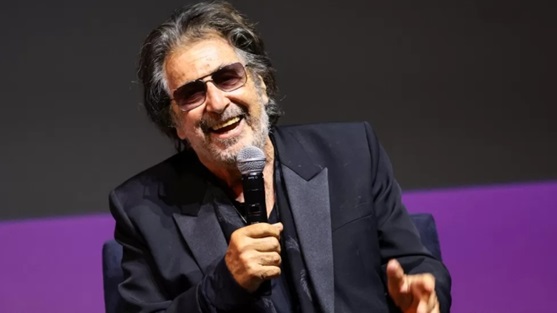The Godfather has never been a godfather.
At least, he is pretty sure that is the case.
One of the biggest film stars of all time, Al Pacino is sitting in a suite in a Beverly Hills hotel, looking surprised at the idea that this is an honour which has passed him by.
“I’m not convinced, but I don’t hang with people who’d ask me that, I guess," he muses.
"I don’t remember anybody asking me that."
If you are Al Pacino’s godchild and he has forgotten, as his character Michael Corleone famously said in The Godfather, “it’s not personal.”
Pacino has spent a lot of time recently looking back over his life, because at the age of 84, the star of films including Dog Day Afternoon, Heat and The Irishman has written his autobiography, titled Sonny Boy, after what his mother called him.
He explains that “part of the reason” he wanted to commit his life to paper was becoming a father for a fourth time last year - to a boy, who is now 16 months old, called Roman.
The book is a way of guaranteeing that the baby will have the opportunity to learn about his father’s story.
“I want to be around for this child. And I hope I am,” he shares.
“I hope I stay healthy, and he knows who his dad is, of course.”
Pacino, who has never married, is no longer with Roman’s mother, the film producer Noor Alfallah, but they are co-parenting. However, from what he says, most of his day-to-day involvement is limited to online contact.
“He does text me from time to time,” is what Pacino says about Roman.
“Everything he does is real. Everything he does is interesting to me. So, we talk. I play the harmonica with him on the other video thing, and we have made this kind of contact. So, it’s fun.”
Al Pacino once again won hearts and minds with an on-screen performance.
Friends have been contacting Al Pacino asking him why he’s written a memoir, and he admits to "sort of regretting it”.
Over the years he had turned down several offers but decided that now “enough has happened in my life it could possibly be interesting enough for someone to read”.
What he found particularly enjoyable was looking back over his childhood, growing up in New York’s South Bronx.
And it is clear that he has no problem revisiting his biggest films.
The Godfather
It is more than 50 years since Francis Ford Coppola’s The Godfather made Pacino famous. Its sequel, The Godfather Part II, has its 50th anniversary this December. Both films won Best Picture at the Oscars. (There was also The Godfather Part III in 1990, which Pacino says had "problems").
The truth is that Pacino was almost not part of them.
At the time, things were rather different. He was literally almost made an offer he could not refuse.
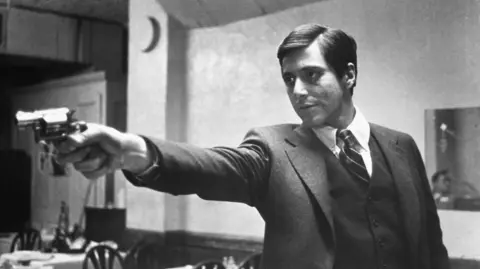
Sitting back with a beaming smile, Pacino tells with relish the story of exactly how close he came to being sacked during the first two weeks of filming: “When your director talks to you and says, ‘You know, I had a lot of faith in you. What's happening? You're not delivering.’
"And you hear the chirping all around. You start to feel, I don't think I’m wanted here.”
The studio was putting pressure on Coppola to replace Pacino, whose performance they felt was flat.
Everything would change with the filming of one of The Godfather’s most famous scenes, where his character Michael Corleone uses a gun hidden in a restaurant toilet to kill a mob boss and a crooked cop, a sequence which allowed Pacino to unleash the power in a performance which is now regarded as an all-time great.
He believes that Coppola moved the scene up the filming schedule to “Get to the meat because that’s what the studio wanted to see".
"He now claims he didn’t,” Pacino laughs.
Either way, it changed his life.
He then shares a fascinating theory about who would have replaced him if he had been sacked.
He pauses: “Bob De Niro comes to mind.”
This would certainly have changed film history – Robert De Niro entering the Godfather series a film early and playing Michael rather than the young Vito.
“Yeah, sure. Why not?” chuckles Pacino. “Well, you know, I'm not irreplaceable.”
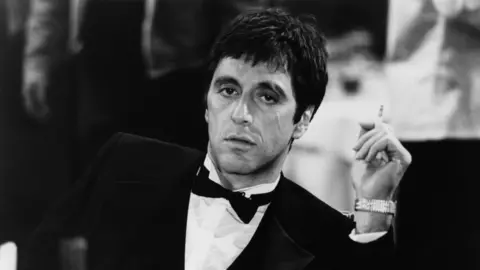
However, it is 1983’s Scarface which seems to hold a special place in his heart.
“It’s got something. It was powerful,” he beams when the ultra-violent, cocaine-fuelled gangster film is brought up, describing its rise from box office under-achiever and Razzie nominee to cult classic, as “a happy story”.
“It was the hip-hop community that embraced it and were able to see the story in there,” he says, pointing out that the film broke VHS sales records.
When I put the theory to him that perhaps this is the film for which he would like to have won his Oscar, rather than his triumph a decade later for playing a blind veteran in Scent of a Woman, he replies with a “Yes, that’s interesting”, doubling down with a “Yeah. I would like to even have got nominated”, before back-tracking slightly with a “Not that I’m turning my back on Scent of a Woman”.
But the implication is clear.
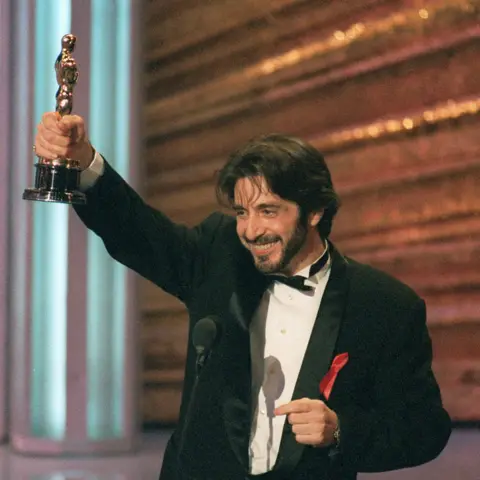
The future of Hollywood
What also shines through throughout the interview is just how much Pacino still loves the big screen.
Despite box office ticket sales having fallen 40% in a decade, he cannot imagine a Los Angeles without cinemas.
“It can’t happen.”
He pauses before repeating “It can’t happen” and then reeling off a list of directors (one in his 60s and two in their 80s) who he believes will keep cinema safe: “That’s what Scorsese is doing. That’s what Tarantino is doing. Francis Coppola is doing it.”
The latter is a particularly bold choice to mention when Coppola’s current self-financed film Megalopolis is being regarded as one of the biggest box office flops of all time.
Pacino would do well to remember the classic Godfather quote: “A friend should always underestimate your virtues.”
There is, however, something deeply reassuring when he sums up why he believes everything will be all right for cinema by saying: “Maybe it’s my age talking. Things go on and then they change because that’s who we are.”
He is also very laid back when it comes to AI being used to replicate his likeness after his death: “My children will take over when I’m gone, and they will take care of it. I trust them.”
He will not be leaving any stipulations about what he can and cannot appear in, shrugging as he says: “I don’t care about that.”
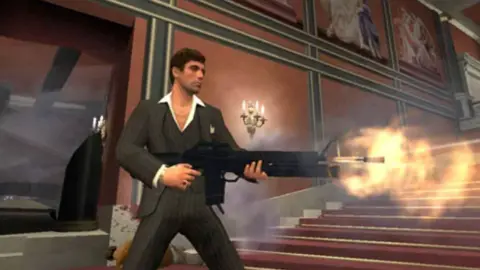
Our allotted 45 minutes have turned into almost 1 hour and 20 minutes as it is clear how much he enjoys storytelling.
Highlights included his long tale of how he believes he may have died during the pandemic, after collapsing in his house.
(“People now think I don’t believe in the afterlife because I said I saw nothing. No white tunnels. Maybe there’s no afterlife for me, but maybe someone else is going somewhere because they did what I didn’t do.”)
He is also happy to talk in-depth about finding out in 2011 that his bank accounts were empty.
(“I was out of money. It was gone and my accountant was in prison. I was spending $ 400,000 a month and didn’t know it was happening. You’ve got to be dumb.”)
And when it comes to the question of what he is watching at the moment, Pacino has just blitzed the second season of Netflix’s Monster, dealing with the Menendez Brothers. That morning he handwrote Javier Bardem a letter to congratulate him on his performance.
Leonardo DiCaprio and Adam Driver are two other younger actors he really admires, while he sums up his own career with the borrowed quote: “The standouts usually have me with a gun. They say to give Pacino a gun. You’ve got a hit.”
Oh, and he reveals that Jamie Foxx is the best chess player in Hollywood. Pacino used to play a lot and laughs when I ask if he has ever taken on Robert De Niro. “I don’t even know if he knows the rules,” he says.
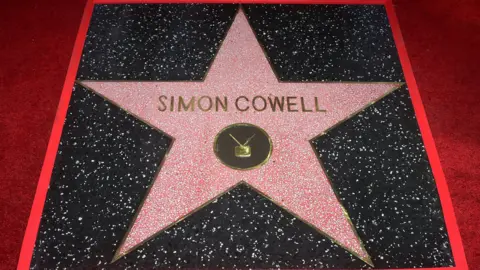
One very unexpected piece of information emerges when he places his mobile on the table. His phone case is a montage of pictures of Shrek. He explains that a few years ago his youngest daughter Olivia put it on, and he’s kept it there to please her.
But despite carrying Shrek around, one thing he does not want to do is provide voices for animated films: “I can’t do it. I’ve tried.”
I put it to him that is he really saying that one of the great method actors cannot do cartoon voices? Not even, say, a panda?
“OK, I think I can,” he relents, before chortling and adding: “I seriously don’t want to.”
Finally, as well as never having been a godfather, there is another glaring omission for Pacino’s list of awards - the Hollywood Walk of Fame.
As soon as the topic is brought up, he interrupts: “Oh, I don’t have a star.”
This is something he has known for a while and turns and asks his assistant Mike: “Is there a mechanism for all of this? To be a star?”
“You’ve been a busy man?” shouts back Mike as a way of explanation.
And does he want one?
“Oh yeah. Sure.”
At 84, Pacino is still a man with Hollywood dreams.
BBC

